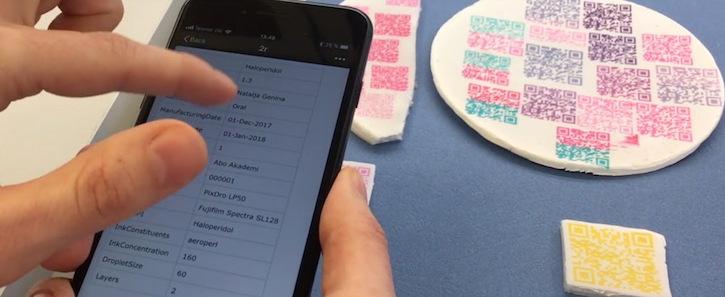- Politics
- Diversity, equity and inclusion
- Financial Decision Making
- Telehealth
- Patient Experience
- Leadership
- Point of Care Tools
- Product Solutions
- Management
- Technology
- Healthcare Transformation
- Data + Technology
- Safer Hospitals
- Business
- Providers in Practice
- Mergers and Acquisitions
- AI & Data Analytics
- Cybersecurity
- Interoperability & EHRs
- Medical Devices
- Pop Health Tech
- Precision Medicine
- Virtual Care
- Health equity
An Edible QR Code Might Advance Precision Medicine
The development helps patients monitor their drug intake through a smartphone app.

Image has been resized. Courtesy of University of Copenhagen.
One of society’s greatest challenges is its growing dependence on prescription narcotics. In the last decade, soaring rates of drug abuse across the United States have led to a sharp increase in emergency room visits, and President Donald Trump’s administration is seeking some $13 billion in the next budget to combat the opioid epidemic.
But physicians and healthcare innovators hope that the onset of personalized medicine will empower people to better control their intake of drugs, as doses become specifically designed for the individual.
In January, a group of researchers at the University of Copenhagen in Denmark, published a paper describing one such way of personalizing prescriptions in drug production.
The group printed drugs in QR-coded patterns onto a white edible material, allowing each dosage to be tailored to fit an individual patients’ needs. The thinking is that this high-tech type of drug production has the potential to protect against incorrect medications, overdoses, and even fake medicine.
Natalja Genina, PhD, assistant professor at the school’s department of pharmacy and a co-author of the paper, said she believes the method can reduce the current waste of mass-produced medicines that are left unconsumed.
“The idea of this personalized dose is that it won’t be produced en masse but in smaller amounts,” said Genina. “Sometimes patients split the pill incorrectly, or take too little or too much. That can have negative side effects.”
The QR code, which is printed in edible ink on the drug, will allow the patient to scan a barcode by a mobile phone app, revealing the patient, the dose, and how it should be administered. The app will also create an automatic alarm on a patient’s phone for when it should be taken.
The researchers hope that, going forward, a regular printer will be able to print the QR code on the medical drug.
"If we are successful with applying this production method to relatively simple printers, then it can enable the innovative production of personalized medicine and rethinking of the whole supply chain," said professor Jukka Rantanen, PhD, a member of the department of pharmacy and a study co-author.
Similar to apps that allow users to monitor their heart rate or the number of steps they’ve taken, the phone app will contain the patients’ medical data and track their treatment plan. For data protection, only the patient will be able to access the platform using a personal password.
But a drawback of this type of treatment is that patients will always need to carry their smartphones with them. Genina said some people might not feel comfortable tracking their progress.
“As it is personal medicine, there will be more responsibility on the patient to track their dose and continuously monitor their health,” she said. “Some people might not like to constantly log in to this platform to be reminded that they are sick, while for others, it will be a relief.”
The research into the QR-coded medicine is still in the trial phase, and Genina said once it passes a review, the group will start clinical based tests.
But the technology will then face another battle, with the pharmaceutical industry, which might not like to see a change to the status quo of mass drug production.
Genina believes that personalized medicine could bring back the esteem of pharmacists, who with the advent of online shopping have steadily lost their role in society.
“For 100 years, we were producing medicine in the tablet form. Now, we are much more flexible and can make it in any shape and way. This can be a way for pharmacists to produce on-demand medicine and stay relevant,” she said.
Related
Investors Urge Apple to Address Childhood Smartphone Addiction
Smartphones Can Help Track the Progression of Multiple Sclerosis
When Digital Dieters Don't Track Their Data
Podcast: Adoption of Healthcare Tech in the Age of COVID-19 with Dr Kaveh Safavi
June 22nd 2021Kaveh Safavi, MD, JD, global health lead of Accenture Health, discusses how the pandemic influenced the speed at which healthcare organizations adopted new technologies and how this adoption is impacting patient care.
